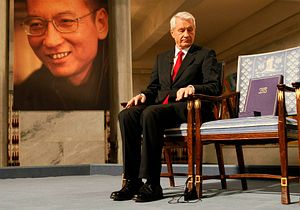On Monday, December 19 the Chinese and Norwegian Foreign Ministries distributed a press release announcing that full normalization of their political and diplomatic relations was reached during the Norwegian minister of foreign affairs’ visit to Beijing. This normalization comes six years after relations were frozen following the awarding of the Nobel Peace Prize to Chinese dissident Liu Xiaobo in 2010.
Part three of the statement reads: “The Norwegian Government reiterates its commitment to the one China policy, fully respects China’s sovereignty and territorial integrity, attaches high importance to China’s core interests and major concerns, will not support actions that undermine them, and will do its best to avoid any future damage to the bilateral relations.”
This statement is rather telling in a time when U.S. President-elect Donald Trump has called into question the U.S. take on the “one China” policy and the intensification of many of China’s territorial disputes, most notably in the South and East China Seas. Perhaps out of unease, China has been shoring up ties elsewhere with more willing partners. For example, Beijing recently rewarded Malaysia with the signing of 14 cooperation pacts worth RMB 144 billion ($20.8 billion), which included a major defense deal, after its promise to handle South China Sea disputes bilaterally rather than through ASEAN. Can the sudden unfreezing of Sino-Norwegian relations be seen as part of China’s ongoing charm offensive to countries that do not challenge its core interests?
Norway has tried to woo China into normalizing relations ever since the freezing of the relations by, for example, accepting Beijing’s application to join the Arctic Council as an observer as well as opening the China-Nordic Arctic Research Center in Shanghai* in 2013. Norway also returned seven columns from the Old Summer Palace in Beijing, more than a century after they were acquired by a Norwegian cavalry officer, and a long-lost 1927 Chinese silent film the National Library of Norway discovered in its archives in 2011. Norwegian Prime Minister Erna Solberg and the rest of her government also refused to meet with the Dalai Lama in May 2014 when he visited Norway, which sparked a national outcry. All of this to no avail — China would not budge on its bilateral relations with Norway until now.
So what explains China’s sudden willingness to resume bilateral relations? Several factors are at play. Consider, for instance, the fact that the freeze in relations between the two countries six years ago came at a time when a Sino-Norwegian free trade agreement was being discussed. Now that high-level bilateral government meetings are resumed, the negotiations about this agreement can commence once more, with huge potential for both countries.
For Norway, economic relations with the much bigger China are naturally of extreme importance. The shares of Norwegian salmon exporters, which had been largely excluded from the Chinese market due to reports that it was “unhealthy,” rose on Monday, with Grieg Seafood and Marine Harvest up 2.7 and 1.6 percent respectively.
The resumption of diplomatic relations will also be beneficial with China, which is looking more into the possibilities the northern link can bring. If China is able to use the Arctic sea route to transport goods to Europe, this will cut between 12 to 15 days in transportation time, with huge economic advantages.
Meanwhile, in addition to Trump’s controversial statements regarding the U.S. approach to the one-China policy and the South China Sea, he had slammed China’s alleged currency devaluation. Together with what it seems like a more protectionist American economic policy, Beijing is looking to get more free trade agreements with other Western powers to protect its economy.
Despite the goodwill that Norwegian governments had shown toward China earlier, it seems like Benjamin David Baker’s reporting earlier this year that it might be best for Norway to stand the storm was the best advice. No action from Norway — apart from issuing an official apology for the Nobel Committee’s decision — would have been able to help Sino-Norwegian relations as much as U.S. President-elect Trump and his tweets have.
*A previous version of this article misstated the location of the China-Nordic Arctic Research Center.
Lieke Bos is a Project Officer at the Royal United Services Institute for Defense and Security Studies (RUSI). She holds a MA from the University of Warwick and a MSc from the S. Rajaratnam School of International Studies (RSIS). The views and opinions expressed in this article are those of the author and do not necessarily reflect the official position of RUSI.
































